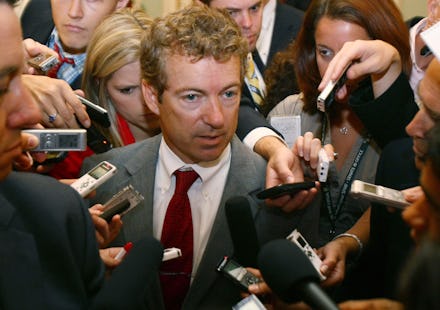Watch Rand Paul Explain to a Female Reporter How to Ask a Question

New presidential candidate Rand Paul's post-announcement media blitz took an unsavory turn Wednesday morning, when the Kentucky senator decided to play journalism professor with NBC's Savannah Guthrie.
Paul repeatedly interrupted the Today co-anchor, who was challenging him on sensitive policy matters, then snapped at Guthrie when she followed-up and pressed for answers.
Guthrie held her ground as Paul twice accused her of "editorializing," or injecting personal opinion into what were really pretty simple, legitimate questions about his positions on aid to Israel and the Iranian nuclear negotiations. (He has shifted on both questions, hence the cranky responses.)
Paul responded by offering the veteran political reporter and former White House correspondent some unsolicited advice on how to do her job:
"Before we go through a litany of things you say I've changed [positions] on, why don't you ask me a question, 'Have I changed my opinion'?" Paul said, cutting off Guthrie mid-sentence.
"You've editorialized," Paul continued. "Let me answer a question. You ask a question and you say, 'Have your views changed?' instead of editorializing and saying my views of have changed."
Paul has a reputation for having a thin skin with skeptical reporters. This latest showing will do little to quiet concerns over his ability to keep cool when faced with the serious scrutiny regularly applied to contenders in a highly charged presidential primary campaign.
Watch the whole interview here:
Not the first time: Wednesday's exchange mirrored another short-tempered performance, during a Feb. 2 interview with CNBC's Kelly Evans. Paul shushed Evans after becoming irritated by a series of questions about tax policy and comments he'd made about anti-vaxxers.
"Part of the problem is that you end up having interviews like this where the interview is so slanted and full of distortions that you don't get useful information," Paul said, after Evans asked about his 2016 prospects. "I think this is what's bad about TV sometimes, so frankly, I think, if we do this again, you need to try to start out with a little more objectivity going into the interview."
As a candidate trying to win the nomination of a Republican party that has struggled to attract support from women over the past decade, Paul would be wise to quit to analyzing the interviewer and focus on simply answering their questions. Because — if he's lucky — this is just the start.